Think Climate Indonesia

An initiative by Facilitated by



An initiative by Facilitated by


July 21, 22 & 27, 2021
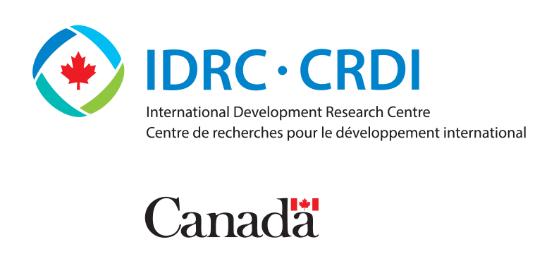

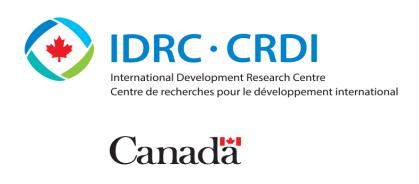

While Indonesia is a world leader in terms of biodiversity, it also has one of the highest rates of deforestation. Dependence on fossil fuels and management challenges related to agricultural expansion, a rapidly growing urban population, and forest and carbonrich peatlands place Indonesia among the world’s top emitters of greenhouse gases, threatening Indonesia's vast tropical forests and contributing to its large carbon footprint.
Think Climate Indonesia is a three-year partnership supported by the International Development Research Centre (IDRC) and the Oak Foundation aimed at enabling local think tanks in Indonesia to engage more effectively in climate actions.

Think tanks straddling the boundaries between research, policymaking, and citizen engagement have the ability to respond to the complex challenges of climate change through informing evidence-based policy with local knowledge and expertise in timely, relevant, and accessible ways.
The initiative is structured around three major approaches:
• Increase relevant data and evidence generation by supporting think tanks in filling data gaps and generating evidence for policy needs that address emissions reductions and climate resilience.
• Deepen research capacity and strengthen policy engagement so that think tanks can meet the demands for evidence and connect and communicate with appropriate actors.

• Seed change coalitions by fostering “coalitions of the willing” to collaborate for the purposes of identifying data needs, articulating policy research agendas, developing knowledge needs, and creating political momentum.

This three-year partnership provides the core funding for the organizational and research activities of five local think tanks

Yayasan Inobu:
Sustainable Agroforestry Practices for Achieving Mitigation and Adaptation to Climate Change. The Cases of Four Provinces: Nusa Tenggara Timur, Jambi, Papua Barat, Sulawesi Tenggara.
WRI–Indonesia World Resources Institute–Indonesia:
The Role of Social Forestry in Climate Adaptation and Food Security: Evidence from Riau Province.
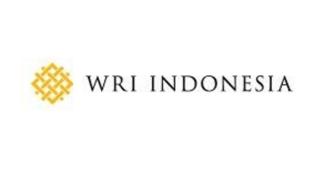
PATTIRO Centre for Regional and Information Studies:
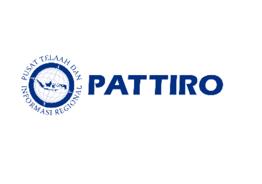

Forest and Land Rehabilitation Program: Implications for Climate Mitigation and Farmer’s Local Livelihoods in East Kalimantan Province.
Yayasan Kota Kita Our City Foundation:
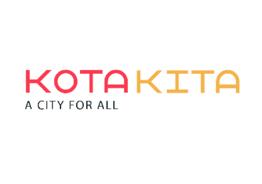

Climate Foodprint in Indonesian Cities: Studies from Semarang and Bima.
Kemitraan Partnership for Governance Reform
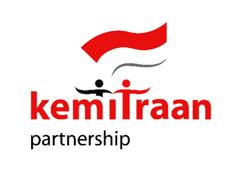
Crafting Climate Governance Policy at Sub-National Scales in Indonesia: An Emphasis on Low Emission Agriculture and Food Security.
Learn more about the Initiative here.

The core aim of the workshop was to bring together the TCI partners to build a shared understanding of the initiative and plan its delivery and implementation.
• To understand each partner’s context and to develop a collaborative approach towards delivering a shared goal for the Think Climate Indonesia (TCI) Initiative.
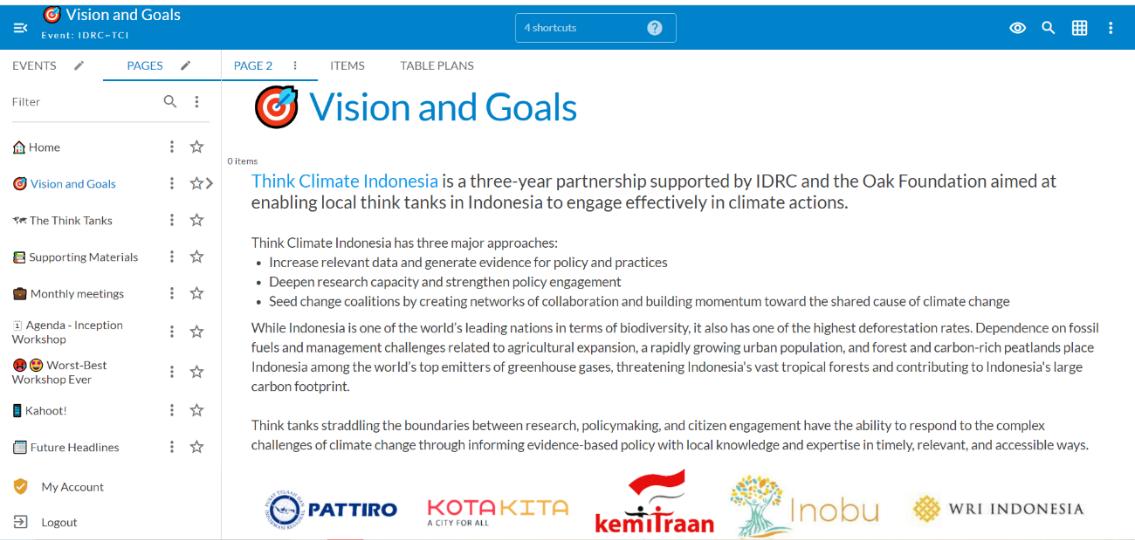
• To share current design thinking on the Initiative and to solicit feedback on certain elements of these ideas.
• To build a sense of community among the think tanks and get to know one another better.
• To encourage cross-project collaboration and identification of common data needs.
• To know the think tank’s work on climate change and explore how think tanks could support the objectives of the Initiative.

This inception workshop was co-organized by the TCI project manager at IDRC and a team of facilitators from Inclusive Innovation (II).
Inclusive Innovation aims to help organizations creating dynamic, participative, and engaging workshops to develop new solutions and strategies to tackle wicked problems and take action on the Sustainable Development Goals.

For this inception workshop, II thoughtfully designed different hands-on activities to achieve the objectives defined by the IDRC in the limited time given, and at the same time, generate a fun and inspirational experience for the participants.
The workshop, which took place on July 21, 22, and 27, 2021, consisted of three online sessions of three hours each. The sessions were held in Kistorm, II’s virtual venue, which

was adapted and personalized for this event. There, participants could find all the information, materials, and boards they needed to take part in the different activities, including sharing sticky notes, as we would do in an in-person meeting.
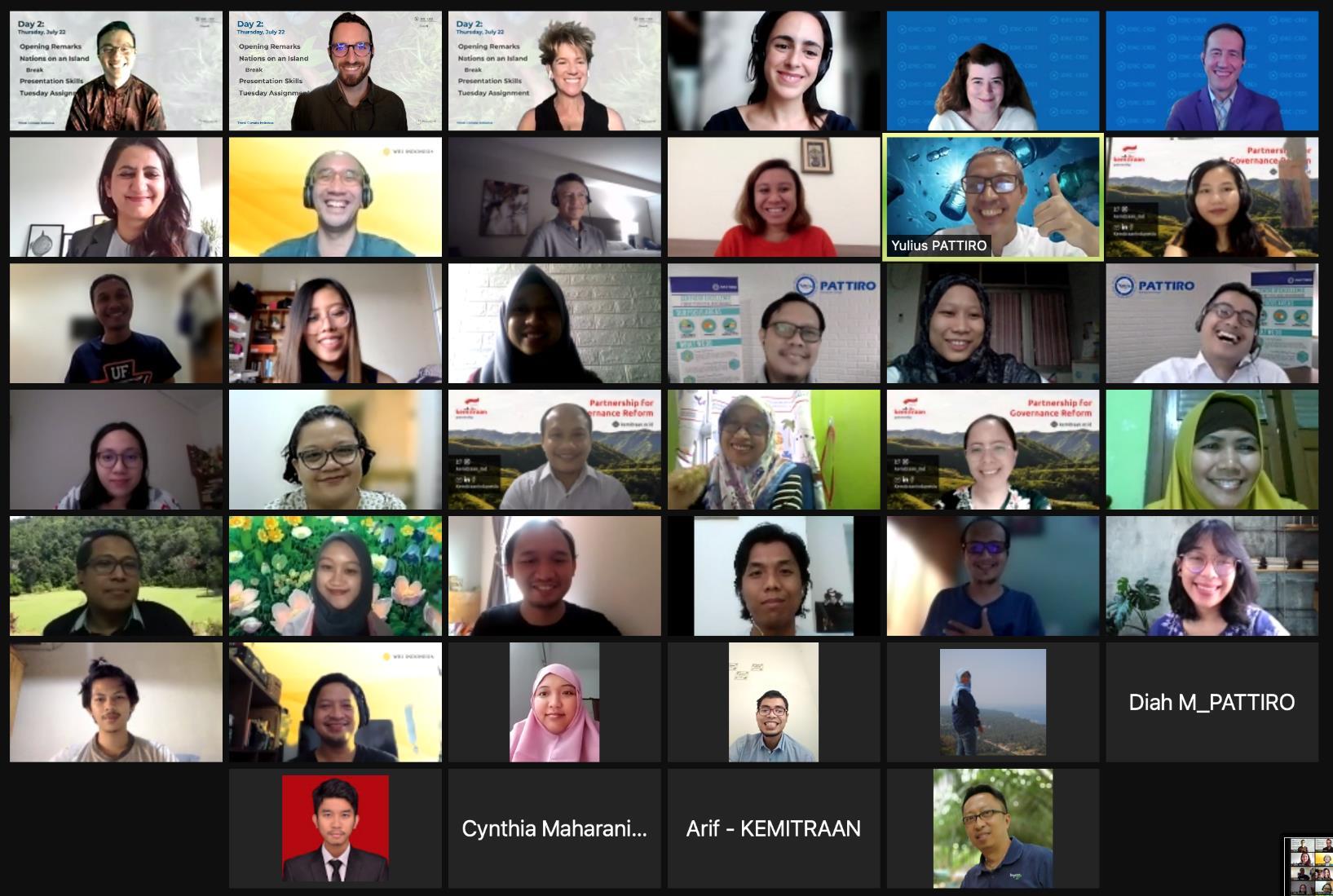
Participants were invited to switch on their critical thinking and imagination, and switch off their passiveness and judgment, to take part in this three-day journey; to think about the possibilities and challenges that the Initiative poses.
The workshop included three main types of activities:
- Team building
- TCI strategy building

- Capacity building on how to improve presentation skills
A peer-learning session where the think tanks will be able to present their projects will be held in May 2022.
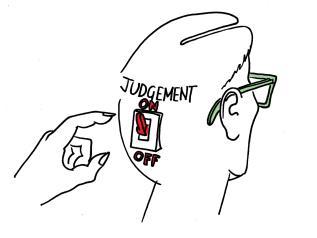



IDRC invited three special guests to open each day’s session. Each of them talked about the importance and power of initiatives such as TCI to taking effective action to mitigate and adapt to climate change in the time we live in:
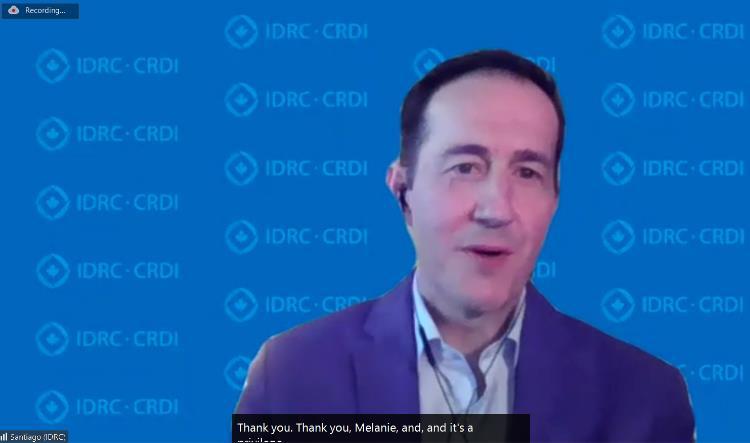

Anindya Chatterjee, IDRC Asia Regional Office Director.
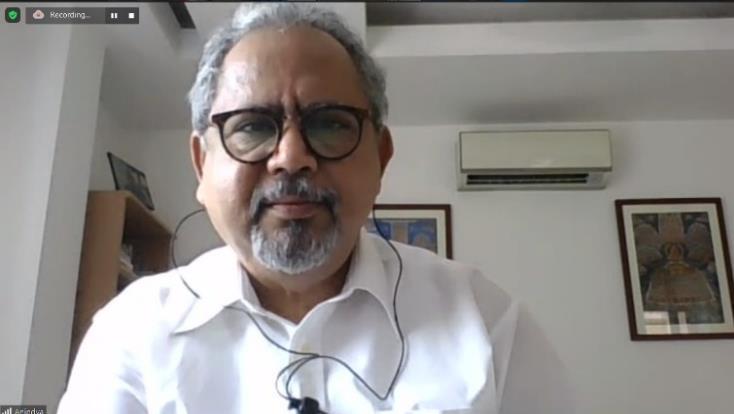
Santiago Alba Corral, IDRC Climate-Resilient Food System, Program Director.
Sahba Chauhan, Climate Engagement Program Manager at IKEA Foundation, previously Climate and Energy Programme Officer at Oak Foundation.
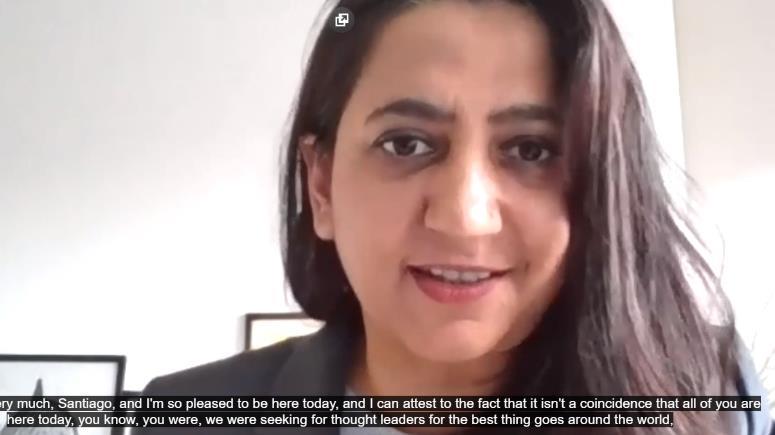

“We hope that the think climate in Indonesia initiative will deepen the work of actively researching and engaging with a range of stakeholders, to mobilize policy processes and actions that address climate change mitigation measures, as well as adaptation and resilience. We have indeed seen how, with the right kind of support, local think tanks can be agents of change.”
Anindya Chatterjee“The work that you are doing is critical in a moment of climate crisis. The way that we engage in mitigation and adaptation to climate change are going to be critical, and we want to address the major challenge for humanity. And in particular, in climate hotspots such as Indonesia, you have an opportunity to inform, to influence, to change the way that we work.”
Santiago Alba Corral“The idea to set up a think tank platform was to increase relevant data and evidence generation, which means to help you to fill data gaps and generate evidence for policy needs (…) and create the critical momentum needed to drive change, and it makes me extremely happy to see that the hard work that the IDRC has put in has led to this day.”

One of the objectives of the workshop was to create a sense of community among the TCI think tank members. This is key to enhancing the communication flow, keeping the teams motivated, and creating the right climate, so all members can work comfortably enough to perform their best.
During the three days, participants had several opportunities for discussion with members of other think tanks. Sometimes the conversations revolved around TCI topics, other times participants had a chance to talk about themselves and get to know each other better.


This inception workshop has changed the way participants feel about the Initiative, being now able to see in each other a shared desire to have a greater influence on climate change mitigation and adaptation policy.
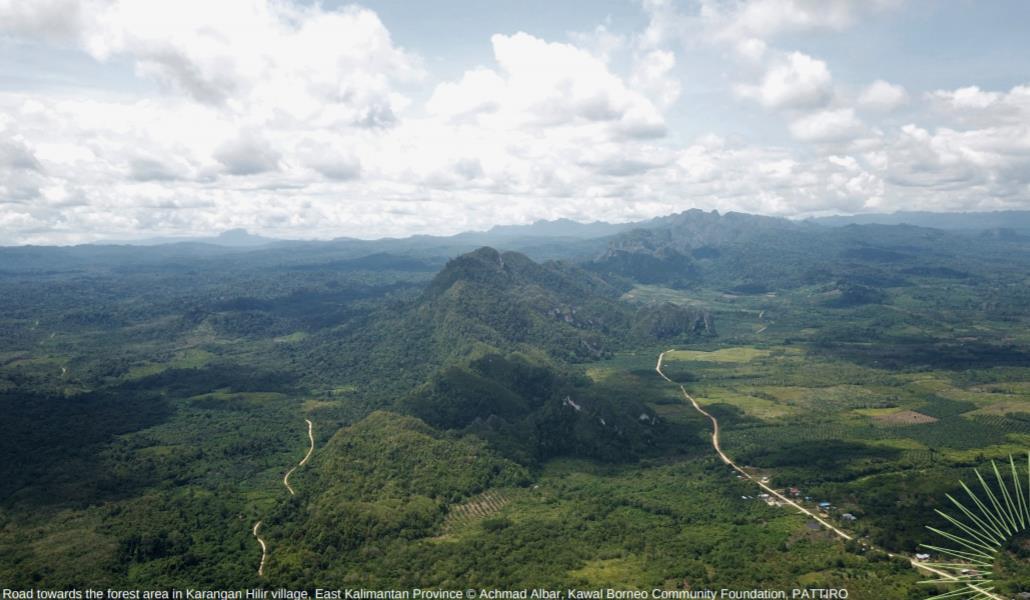
“Can you share two interesting facts about yourself?”

One of the goals of the Initiative is to build a soft infrastructure to facilitate collaborative work among different agents and organizations, as the challenges imposed by climate change require cross-sector and multilevel solutions.
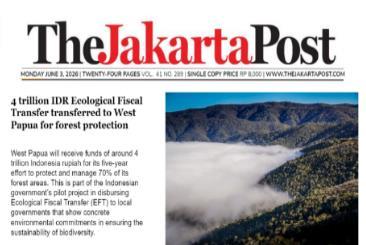
TCI is an opportunity for the five selected think tanks to complement their strengths and weaknesses and join forces to have a stronger influence on climate policymaking by providing novel, high-quality, and evidence-based research.
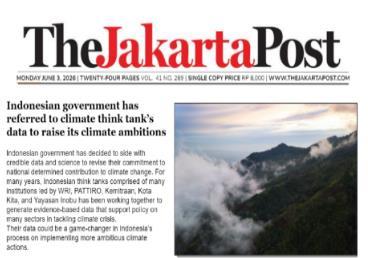


The first step is to have a clearer idea of the commonalities and differences between the five groups, as well as to identify shared interests, motivations, and concerns.

“Imagine the impact of this Initiative in 10 years’ time. What’s the big story? What are the headlines you would like to read about it?”
Participants were asked to reflect on what success would look like for them, after having worked on each of the research projects and some possible collaborative research. The participants were mixed and divided into smaller groups to discuss and answer the question.
Each group was asked to focus on one particular aspect of the possible outcomes of the Initiative. These were the headlines that came out:
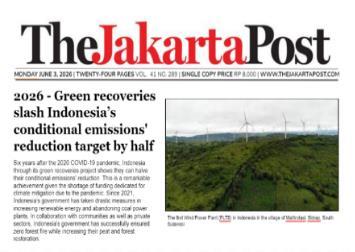
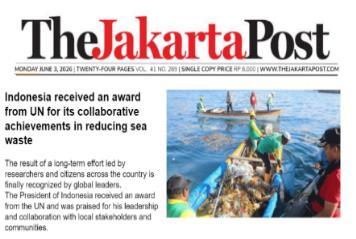
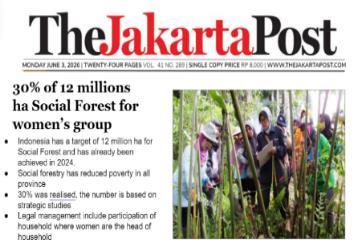
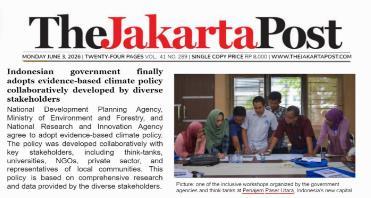
Quality and timeliness of climate research
“Indonesian government has referred to climate think tank’s data to raise its climate ambitions”

Collaboration between diverse stakeholders

Engagement with local and national government
Engagement with the general public and communities
Policy engagement for concrete change

“Indonesian government finally adopts evidence-based climate policy collaboratively developed by diverse stakeholders”
“4 trillion IDR Ecological Fiscal Transfer transferred to West Papua for forest protection”
“Indonesia received an award from UN for its collaborative achievements in reducing sea waste”
“2026 - Green recoveries slash Indonesia’s conditional emissions’ reduction target by half”
Social Inclusion and Gender Equity “30% of 12 million ha Social Forest for women’s group”
The groups were also asked to list the actions needed to make these headlines possible during their presentations. At the end of each group’s exposition, participants had some time to formulate questions and think about how to take these necessary steps.
Many “how might we” questions came up, and the exercise spotlighted some key actions needed for the TCI to succeed in its objectives.
Participants shared 66 questions in total. They were then asked to vote on which questions would be most useful to mark a starting point for a collaboration between the think tanks. The following questions were the top contenders, receiving four or more votes each:


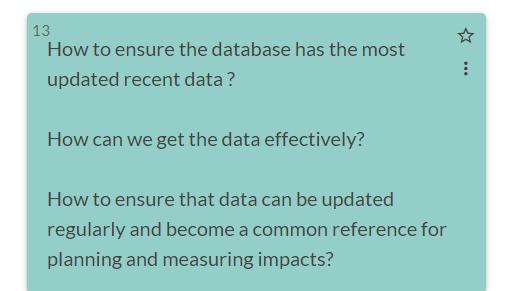


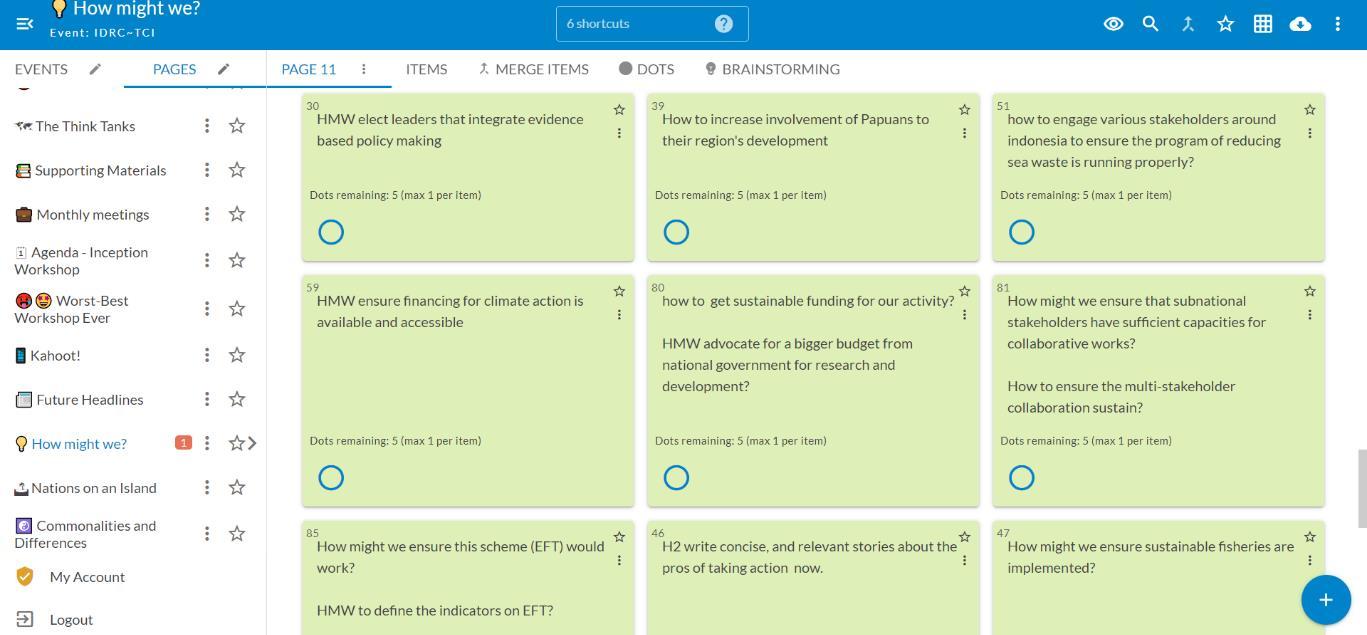



These top questions were the result of the collaborative thinking of the groups, and they mark the direction the grantees can go to have the most impact together. They set a starting point to define a collaborative project and point to the most important and relevant issues to be pursued:
Government Communicate effectively with the government so public authorities can understand the urgency and importance of the matter and the research findings can be translated into public policies.
Data Improve the management of data, identify data gaps, get updated data, and create and regularly update a shared database that can be used as a reference.
Gender Incorporate a gender perspective on climate research and policy.

General public Effectively communicate the research findings to the public to raise awareness and promote participation and capacity building.
Collaboration and leadership Have effective collaborations and dialogues with multiple stakeholders with their own agendas and reach out to other think tanks.

After defining together what success would mean for the members of TCI, the think tanks offered a short presentation about their own organization. While each think tank had to describe itself, they had to do so by imagining themselves as an island nation. By answering a series of questions, the think tanks created a complete picture of the particularities that characterize each of the organizations.
Afterwards, participants had to reflect on the commonalities between the five groups, and then on how to leverage their differences to complement each other.
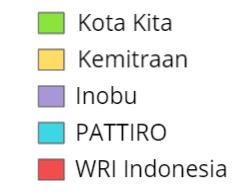
National Motto: What is your think tank’s mandate?


Trade: What do you import? What do you export?
Foreign Policy: How do you engage with other “nations”?
Culture: How do we work together within our team?

Telecommunications: How do we communicate with the general public and citizens?
Geography: What are the locations of your field work?
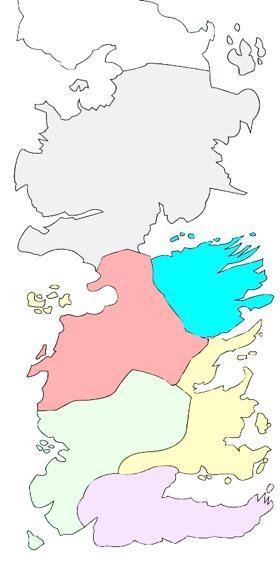
National Specialties: What are you known for? What’s your unique contribution?


Name Partici-Nation
National Motto A nation for all
Trade Imports: technology that assists our growth
Exports: participatory tools and methodologies to help other nations become a nation for all
Foreign Policy
Non-block policy. Impartial cooperation; prioritize helping nations in need
Culture Embracing of participation, democracy, and social welfare. Everybody has an equal voice in the development of the nation
Telecommunications Focus on stimulating discussions and conversations, going beyond one-way education and interactions

Geography Nation divided into 3 provinces. “Resilience, Governance, and Inclusivity.” The nation is comprised of urbanized areas, where it provides public services to most cities through a national participatory budgeting mechanism
National Specialties Specialties: Hosting international conversations, nation of urban enjoyment and wellbeing, nation of inclusive cities
Contribution: Facilitating Public Dialogue, Encouraging Participation, assuring peace across nations
Name KEMITRAAN - Partnership for Governance Reform
National Motto Advance and institutionalize good governance principles to government, civil society, and business sectors
Trade Imports: technical carbon counting expertise and technical expertise related to climate change

Exports: good and democratic governance and social inclusion
Foreign Policy Through collaboration, sharing experiences, and dialogue forum
Culture Benefiting the multidisciplinary and complementary expertise of each member to increase the quality of work results.
Telecommunications Public dialogue
Media engagement (media roadshow, social media platform)
Community dialogue
Geography
National Specialties
Indonesia and Southeast Asia
1. Acknowledged as one of “The Most Significant Impact on Public Policy” Indonesia’s Think Tank by Global Go To Think Tank Index (Global Rank 69)
2. National Accredited Entity (NAE) of Adaptation Fund (The only one in Indonesia)
3. Direct access Accredited Entity (DAE) of Green Climate Fund (One of two in Indonesia)
4. Signature research recognized and acknowledged by government and multistakeholders: Indonesia Governance Index

Name Inobu
National Motto Realizing Sustainability
Trade Imports: Expertise exchange (sharing knowledge)
Exports: Collaborative applied research
Foreign Policy Collaborative projects and knowledge-sharing
Culture We make it happen
Telecommunications By social media, peer-review publication, sharing sessions and www.tanibaik.inobu.org which provides information to farmers
Geography Jambi, Sulawesi Tenggara, Central Kalimantan, East Nusa Tenggara, West Papua National Specialties Known for: Working with farmers, including younger generations to protect nature
Unique contribution: Mapping, certification assistance, alternative technologies
Name Gajah Bertalut
National Motto To move human society to live in ways that protect earth’s environment and its capacity to provide for the needs and aspirations of current and future generations
Trade Imports: satellite images, emissions database
Exports: knowledge product, deforestation data, open data platform
Foreign Policy Natural conveners: promotion of transparency and inclusivity
Culture Count it - Change it - Scale it
Matrix or working collaboratively through cross-cutting themes
Telecommunications Through blogposts, public webinars, social media channels, creating coalitions, working with communities for social forestry and mapping
Geography Riau, South Sumatra, Papua, and West Papua National Specialties Research, Online platform
Name PATTIRO, Centre for Regional Research and Information
National Motto Synergy for Change
Trade Imports: IT for research supports, Expert to Increase Research and Communication Capability
Exports: Evidence Based Policy Papers, Engagement Strategy, Gender Mainstreaming Foreign Policy Data and knowledge sharing, collaborative research/platform, coalition building
Culture Egalitarian, trust, professionalism, integrity
Telecommunications Website, Social media, Brochure/flyer, Videographic
Geography East Kalimantan
National Specialties Support the climate finance, Gender Responsive Planning and Budgeting, gender mainstreaming on social forestry
Technical assistance for local governments and CSOs on climate budgeting
This is a summary of the participants’ comments:
Focus on tackling climate issues
Spirit of collaboration
All institutions want to change the situation
Common desire to generate powerful data to improve policy making
Eagerness to work together and join forces to create a bigger impact
Willingness to encourage collaboration and participation
Championing good governance and transparency
Championing participation and inclusivity
Common culture of collaboration and knowledge sharing
Collaborative research
Common understanding of the importance of involving the government and other stakeholders
Focus on collective action and multistakeholder initiatives
Complementarity among think tanks
Use of social media to reach out and communicate
Non-partiality, unbiased approach
Engagement with communities
Provision of technical assistance for the government and citizens
Expertise and data exchange and sharing
Online platform to convey and disseminate information, work and share research results.
Understand each other’s work so think tanks can complement one another, identifying and leveraging the strengths of each organization
Focus more on common goals
Working together in communicating research results
Build a better communication between nations
Database platform
Learning gender mainstreaming together
As the different institutions have a different geographical scope (some focus on forest and rural area, others focus on cities) they will make a greater impact as a whole. Different geographies, different expertise. saling melengkapi
Different focus allows for different entry points that together contribute to systemic change
Coalition building at national level
Collaborative work, openness to share
Creating collaborative events
Different policy focus as a strength of diversity
Communicating, sharing, and working together
Pool of experts
Learning together on IT to support research
Work together in creating impact
The II facilitation team gave a short introduction with tips for making presentations.1 After the introduction, participants went into break out rooms in small groups to discuss and spot the errors in the video examples shared with the participants. At the end, facilitators asked each think tank to prepare a presentation for the next session about the research project that was selected to be part of the Initiative This was part of a peer review exercise that gave participants the opportunity to practice the presentation skills they had learned.
On Day 3, before the participants offered their research presentations, the facilitation team introduced the PPC/o feedback tool that participants would use to evaluate their peers’ work.


The main objective of a presentation is to capture the audience’s attention. How to do that? Here are some of the most important aspects to consider:
Prepare your presentation Preparing your presentation, and practising it out loud many times, is key. Timing yourself to ensure you stay within the parameters given is also important.
Physical and virtual tech check Is the room in optimal conditions (light, temperature)? Have you got your presentation ready? Is the equipment needed for the presentation working appropriately?

If presenting online, is the video call software updated to its latest version? Have you isolated yourself from noises and interruptions? Are the camera and sound working well? Have you got the right camera lighting and position?
Physical appearance Choose appropriate clothes for the event Do you look professional? If you are using a virtual background, make sure not to blend in.
While presenting: body language Remember to smile, sit straight, and keep your hands away from your face Remember that body language is an important aspect of communication. Look at your audience and connect with your eyes. Remain natural!
While presenting: make it entertaining Give data/statistics, videos, pictures, tell a story, and ask questions. Don’t lose your audience’s attention!

The PPC/o is a four-part tool for providing assertive and productive feedback. The first part describes the “pluses,” the good things about the work being presented to reinforce the positive aspects of it The second part explores the “potentials,” the other possible ideas or outcomes that could come from the idea or project

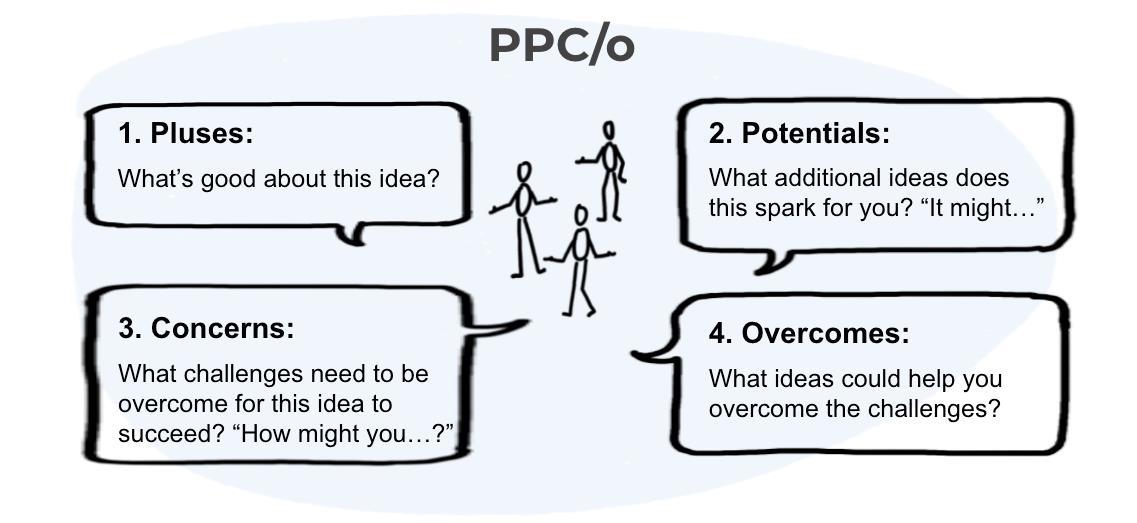

The third part speaks to the “concerns,” the challenges that might come up; identifying these concerns allows researchers to improve the idea or project and do better next time. These concerns are expressed with the formula “how might we/you…?” to promote reflection and action, rather than just focusing and getting stuck on the obstacles. Finally, the fourth part looks at the “overcomes,” potential ways to overcome the obstacles identified earlier.
The facilitation team emphasized that the workshop was an opportunity to work as a community and support each other and encouraged participants to take the feedback from their presentations as support and help from everyone in the different think tanks.
After each of the presentations, participants were directed to Kistorm, where they could write anonymous post-it notes, using different colours for the pluses, potentials, and concerns, following the advice given about using assertive and productive language. This is a glimpse of what came out:

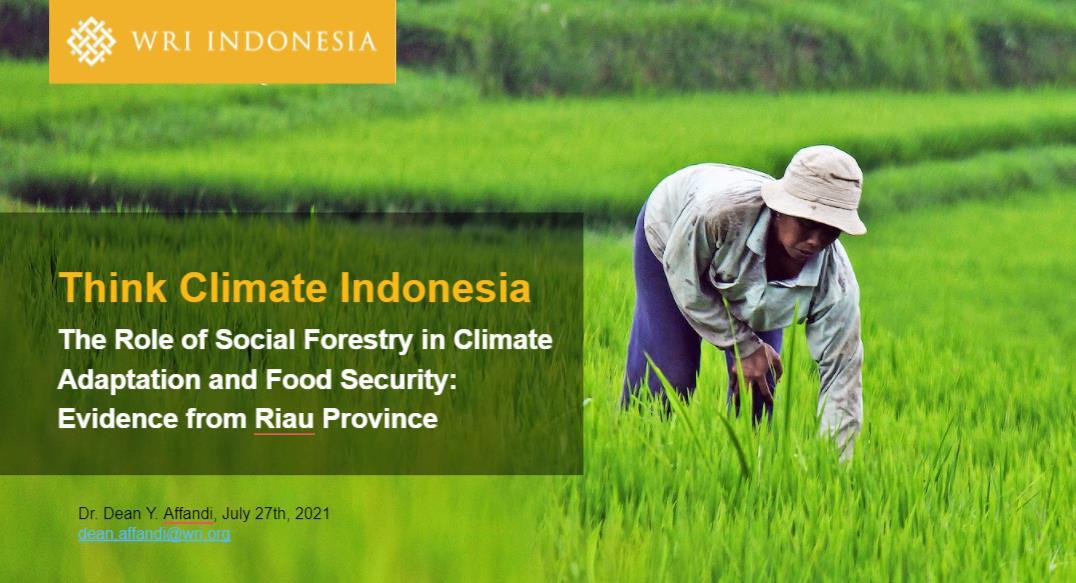
Clean design of the presentation, clear information
Good balance in the use of text, images, and graphics
Choice of the right pictures that help follow the presentation
Confident and engaging presenter, positive attitude
Great narrative and clarity of the explanations
Good at keeping audience’s attention
Makes clear the linkage between social forestry and food security
Gives a new approach on how to manage a project


Good and relevant topic and region
Includes local capacity building in project implementation
Possible comparative study to make the findings more relevant
Expansion of discussions about social forestry
Possible collaboration in research about social forestry
Documentary about the life in the forest
Empowerment of the traditional community
Gender mainstreaming could improve the project
Evidence from local level
Engagement with multistakeholders
Raising awareness about social forestry
Recipe book from the forest local cuisine

Expanding cooperation with indigenous peoples and remote communities


How
Provide tangible benefits for the local people involved directly and indirectly in the project?
Learn lessons and best practises about this research?
Learn about the engagement process with the local community?
Better introduce this complicated issue to the public and the government?
Address land tenure issues and conflicts?
Emphasize/highlight intersectionality in the research?


Ensure social forestry targets can be achieved?
Know about the information about the capacity building program that your project will hold?


Document transfer knowledge to younger generation?
Discuss social forestry and food security in context of driver of change to the landscape, like palm oil plantation?
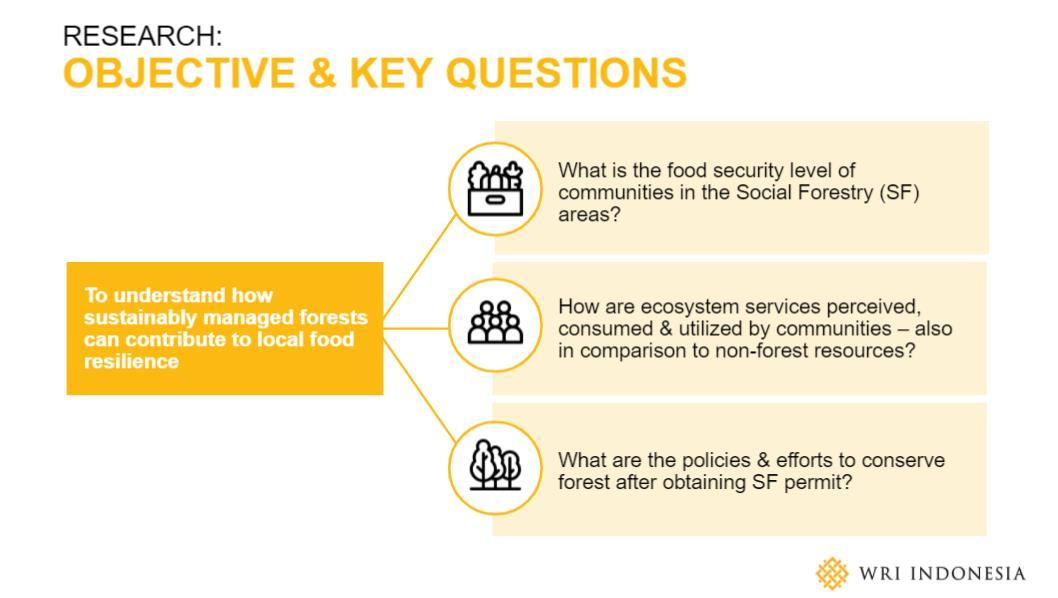
Turn papers into materials that can be very useful for the local people?
Upscale this project to the national level? Replicate in other places?
Use other voices from the team to support the presentation?
Stay to time?
Avoid yellow or light orange typeface on the slide? hard to read from a distance in a room, and hard to see on a screen, unless with a black background
Hear further details about the the research in the next opportunity?

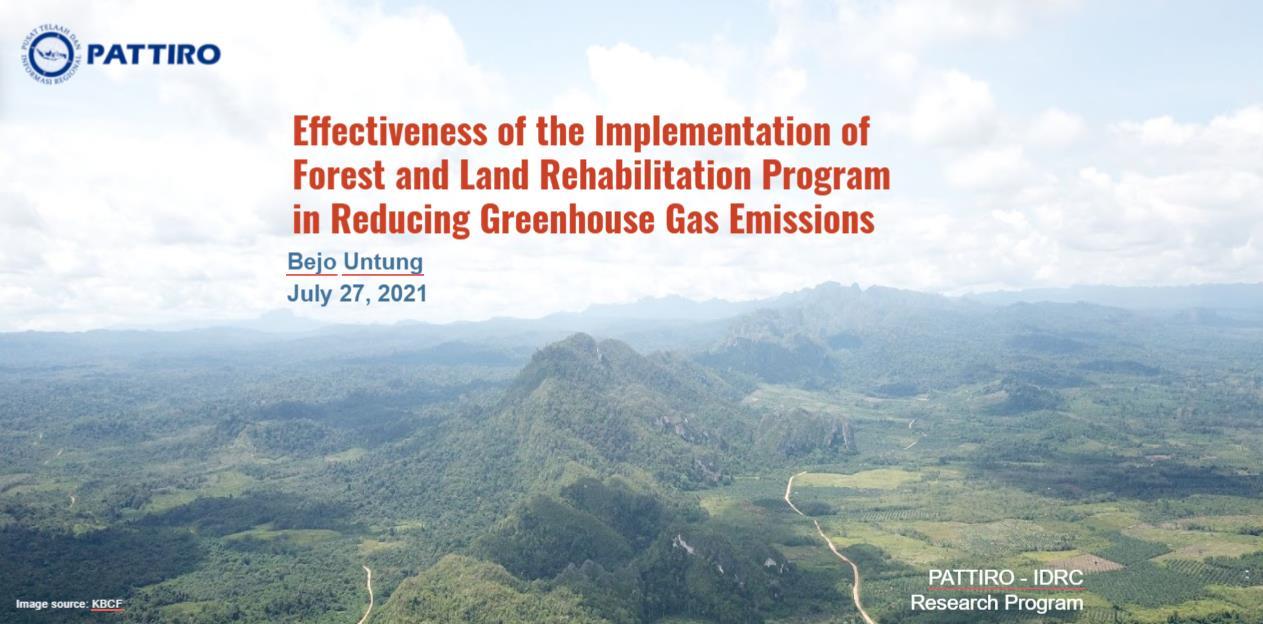
Very complete/thorough/detailed information about the project.

Comprehensive and informative presentation
Complete with data

Relevance with national initiative, related to government plan in RPJMN 2020–2024, alignment with the government
Important and often neglected perspective in dealing with climate change
It includes gender mainstreaming, internally and externally
Provides capacity building for local researchers

Excellent research question

Good topic
Good location: East Kalimantan
Nice pictures
Collaboration with other grantees

Collaborative work
Aligned with new capital of Indonesia
Collaborative with multistakeholder
It will be good if there are comparative case study in other location, as a mini-case in your research
Collaborates on local budget analysis
Ensure social forestry targets can be achieved?
Achieve the research goals during the pandemic situation?
Deal with land tenure issue?
Get the valid data of RHL Organize resources in conducting this research?
Collaborate with others working on similar issues?
Is gender mainstreaming only at the project implementation level? How is gender mainstreaming in the substance of the research?
Make it an entry point for wider collaboration with the government on climate change public policies and budgets?
Learn about government budget based on your research?

Learn about gender mainstreaming best practices in your research?
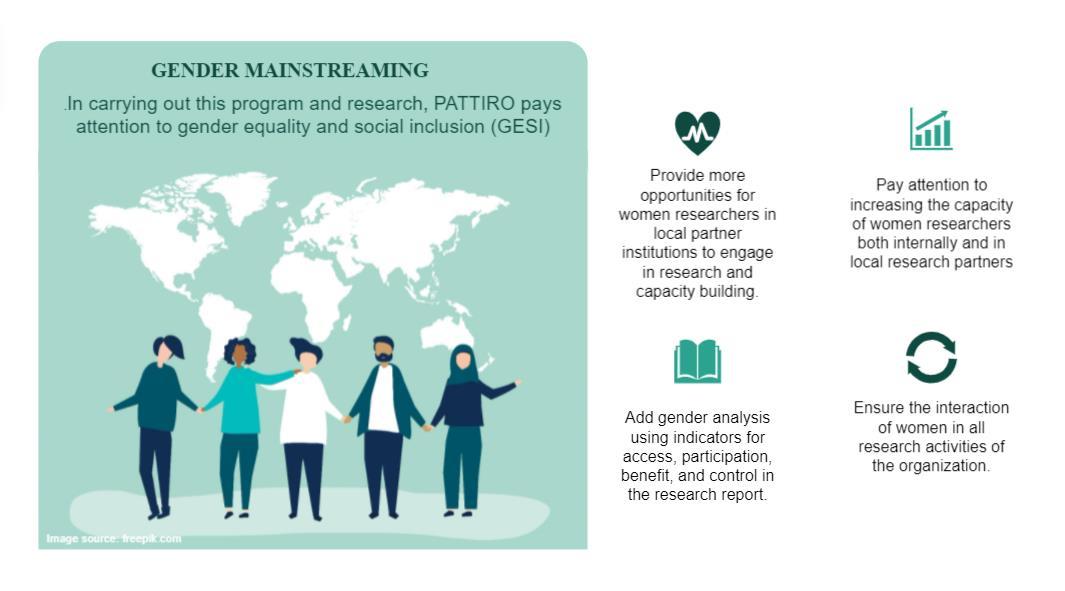

Be able to answer so many questions in limited time?


Keep the presentation concise?
Give more succinct presentation on your ideas Use easier/friendly terms?

Rehearse the presentation more to keep it to 5 minutes?
Use other members of the team to present? - a chance of voices can add energy to a presentation
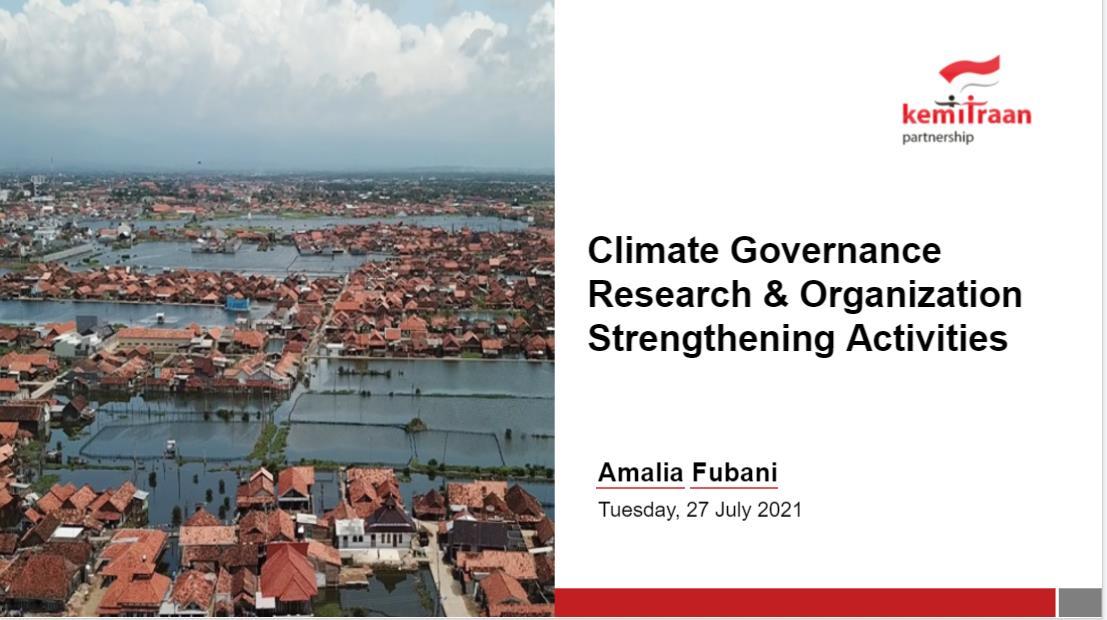

Concise and clear, straight to the point
Timely presentation!
Good framework
Interesting and challenging topic (budgeting)
Stakeholder matrix is very good


Contributes to capacity building
Clear research approach and method
Very strategic research and research objectives
Good way to have an effective government budgeting when it comes to addressing the issue of climate change
Provides a better understanding of government spending on climate change in national, provincal, and district/city level


Budget tagging is important to track the government spending on climate actions
Strategic research and has strong political support
Could raise important aspects that might have been overlooked
Organizational development activities
Could give strong insights to government's commitment on combating climate change
Comparative studies comparing the budget tagging at regional level as a study case, would be interesting, so not only national level
Involvement of multistakeholders
Opportunities for capacity building
Interesting to see subnational government's perception on green growth
How might we…?


Engage the government effectively?
Get a commitment from the government to follow up on the results of the study.
Provide government with a sense of urgency after the report is done and given to the government?
Scale up the budget tagging of climate change tagging to broader province and district?
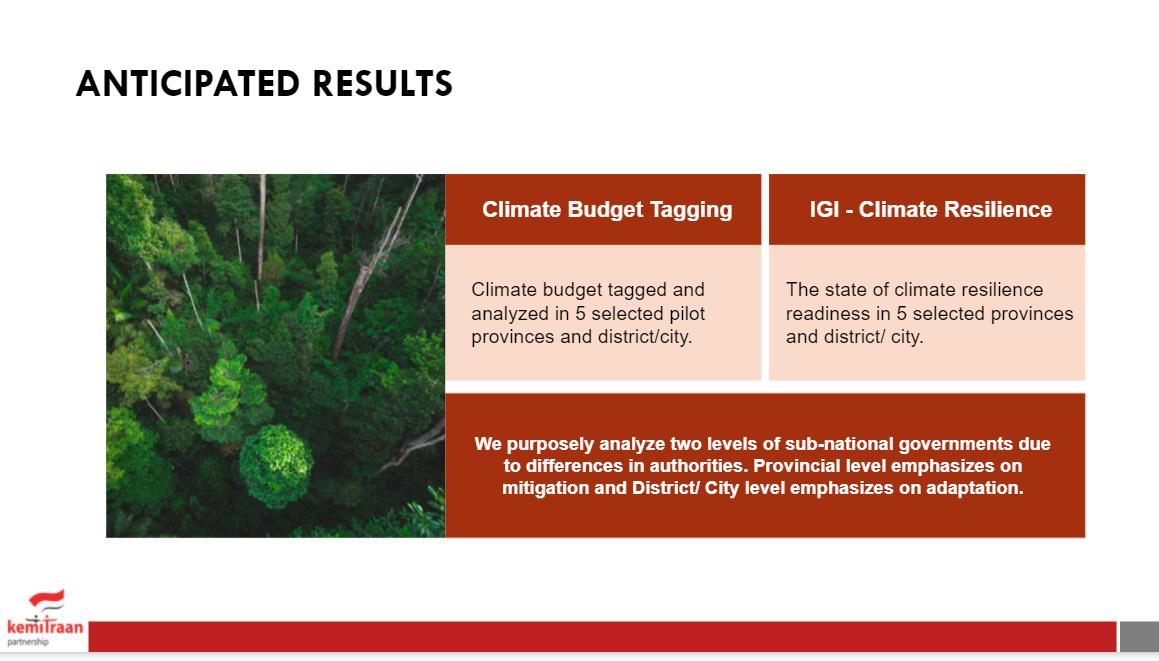

Get reliable set of data at the national level?
Get access and digitize all the budget data? Collect government budget document to do budget tagging?
Develop activities to enhance capacity of organization and personal?

Conduct the budget tagging for climate issue?
Create an effective partnership?

Be sensitive with political issues surrounding this topic?
Make the results mainstreamed across ministries and become a reference?
Raise public awareness?
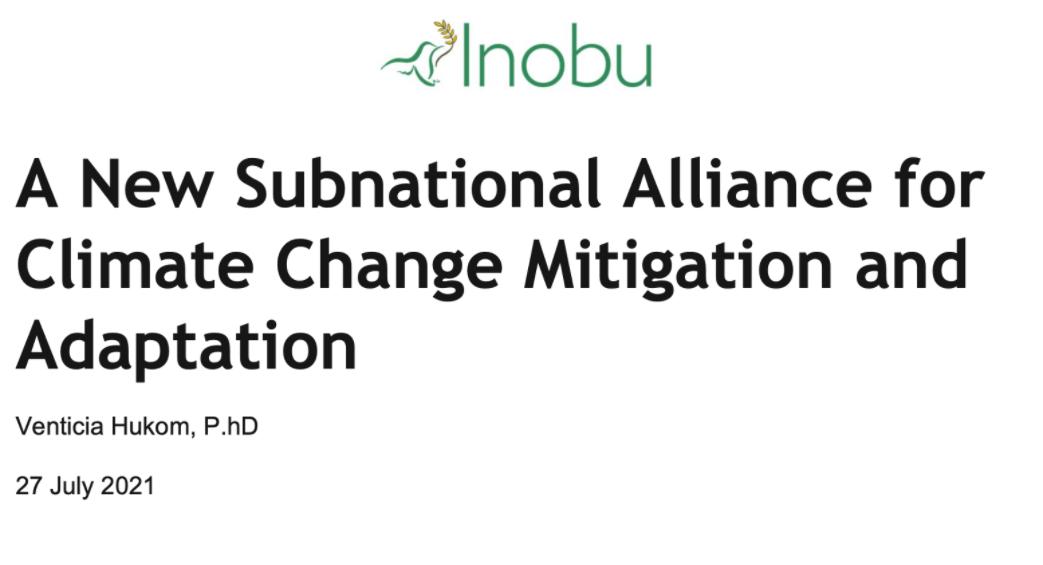
Novel idea
Community involvement
Engagement with local farmers, empowering local CSO
Let the local CSO lead the research direction
Spirit of enhancing other partner capacity building
Very specific research background and contextual problem
Study in multiple locations (Sumatra, Sulawesi, Nusa tenggara and West Papuaas) a comparative study


Good ideas: TERTATA system, climate action lab
Ecological database, its urgent point
Timely presentation!
Compact, simple, and clear presentation
Clear description of the problem and the output
Presenter recovered very well from the coughing episode!
Collaboration to increase impact


Collaboration with all partners to build ecological database Indonesia
Scaling up to wider context
Scaling up the TERTATA system
Expand tech reach for cooperation with indigenous people

Broaden the scope of capacity building
The climate lab. The network could include many different parties with a wide range of issues.
Clear info on what climate change data would be collected
How might we…?

Work with local NGOs?


Engage with local communities and NGOs?

Meet the timeline?
Engage local media?
Manage expectation to local communities?
Prepare the local CSO to be ready to receive their own funding for a bigger project?
Align with the government program?
Make TERTATA be used by a third party such as the local government?
Encourage the government for an ecological fiscal transfer?
Maintain the sustainability of the system that has been built?
Flesh out more on your presentation?
Utilize more pictures in the PPT to make it more contextual for those who don't know the locations?
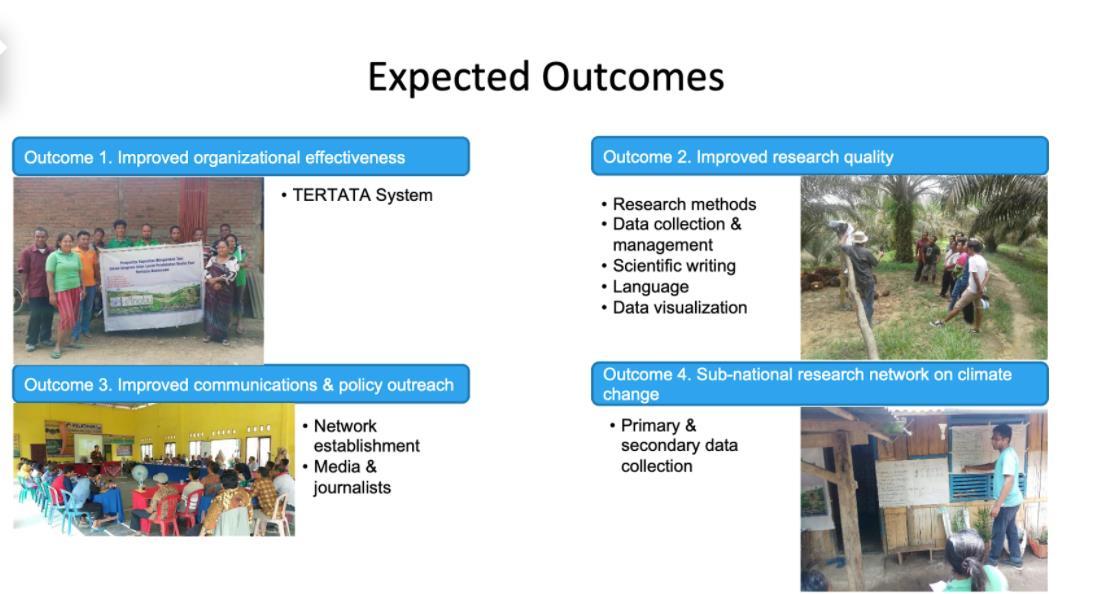

Good topic, often overlooked
Specific cases, with a clear objective

Discussion on food impacted by climate, but also how food worsens climate impacts
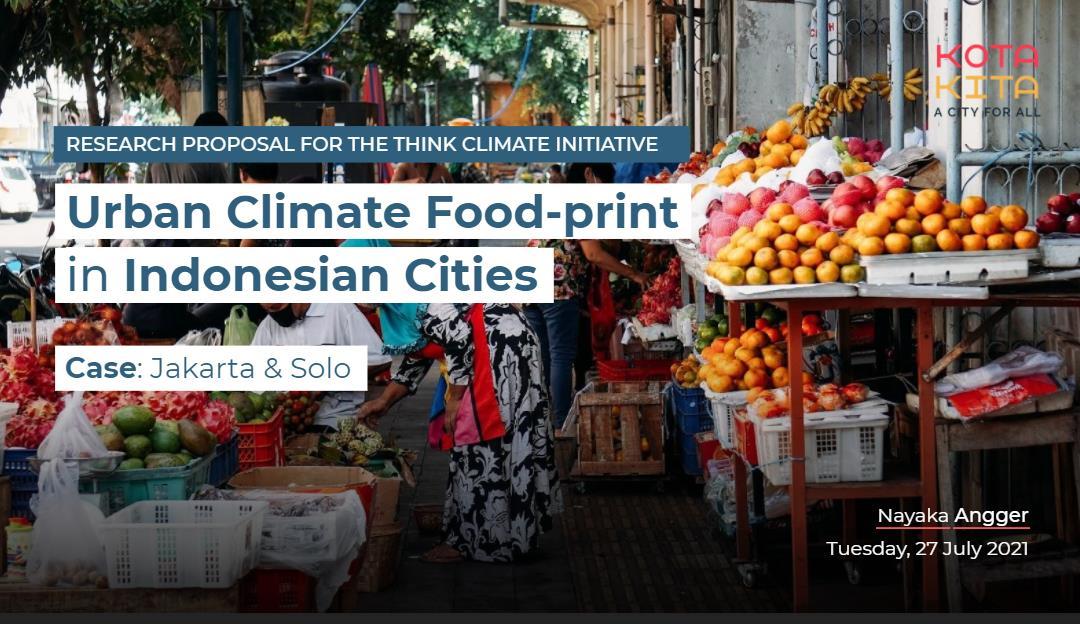
Good and attractive presentation, good flow and explanations
Good visuals and design
The presenter did not read from the slides
Timely presentation
Future combination of rural and urban research on food system
Collaboration between rural and urban FS
Research can be replicated in other cities as well

Collaborative projects in urban setting
Engage more city mayors to participate

Providing sustainable best practice solutions for micro-problem

How much allocation (budget) for food security in national and local level?

Can bring awareness for the public to realize where food comes from
You may talk about the relationship between rural, city, food industry
Discuss the differences of social-economic population, grouping
Elaborate case studies

Connect the research projects in rural and urban setting?
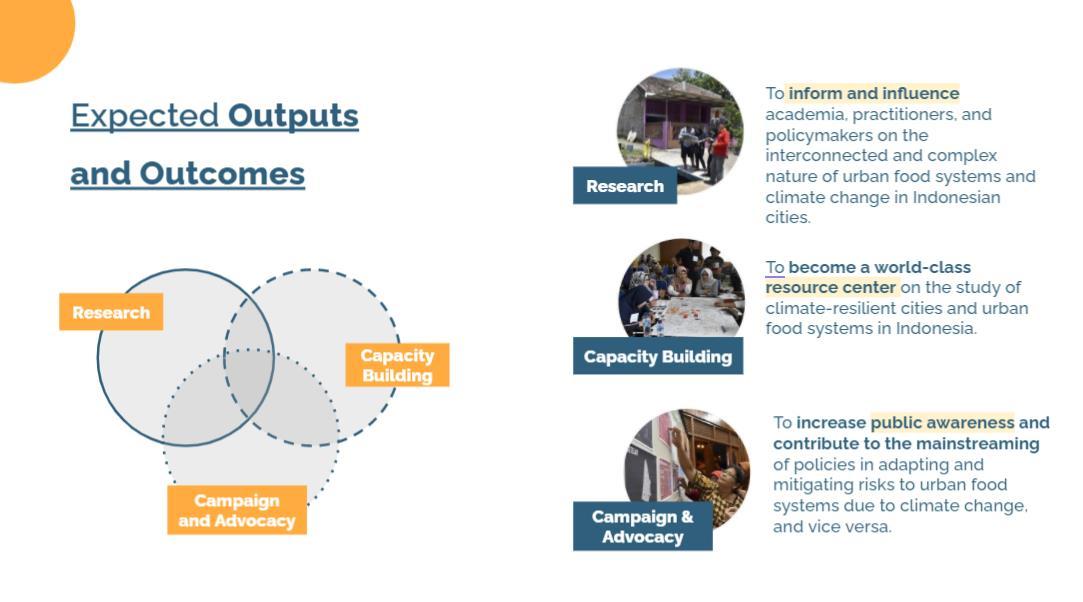

Learn about the lessons learnt from your project?

Learn about food systems and food security in your project?
Involve impacts on different actors in the food system in the study?
Address cities' dependency on rural areas?
Solve the problem in food distribution?
Generate bigger support for this initiative?
Connect the result of KK studies with other institution: city – rural?
Get the latest information and update about this project?
Make city government associations involved in the project?

Further explain about the study area and put context as you still have 30 seconds to spare?
Use less words?

Understanding feedback as a gift that allows us to improve our work and performance helps us value it more and take it positively. As leaders and collaborators, we need to give feedback, but we also need to take it, and know how to.

The facilitators gave the participants time after the presentations to look at and talk about the feedback on their presentations Back in plenary, participants could share some of their insights.
All groups were very appreciative and thankful for the feedback received. The exercise was an opportunity to narrow distances between think tanks and create a sense of collaboration and community among the organizations.


Despite the difficult situation generated by the Covid-19 pandemic which at the time of the workshop was hitting Indonesia very hard the group’s engagement and participation during the inception workshop was excellent overall. Participants put hard work into the presentations and different exercises and made the most of the experience.
The workshop made clear that there is willingness among the think tanks to work together, despite time constraints and obstacles. It was also useful to see the commonalities and differences between groups, to work strategically, building on each other’s expertise, networks, strengths, and the previous research work done in different geographical areas. These differences can make the Initiative stronger
The ideas that emerged during the workshop were very ambitious, and now is the time for each think tank to work hard and attempt their very best. The monthly meetings will be the space to work together to think about how to overcome the challenges and limitations that might arise.
After the workshop, during which time they identified collective values, the five organizations were better acquainted with the other think tanks and team members and are now in a better position to communicate about the Initiative and their respective projects.



The Initiative includes support for opportunities for collaboration through workshops and research projects. At the time of the inception workshop, a topic for a collaboration among the five think tanks hadn’t yet been defined Though some possibilities had been discussed, until the workshop, the priority was to give each think tank time to develop their own research projects.
With limited time available, the virtual workshop focused on the development of an initial workshop and capacity building activities. Nonetheless, the inception workshop clarified the priorities of each of the five think tanks and allowed participants to see routes to collaboration. The different possibilities that emerged from the workshop (see Ideas for collaboration) will be further discussed in future meetings the next of which will be held by the end of August, 2021
It will be important to consider the particular context of the Covid pandemic and find a realistic collaborative idea that adapts to the limitations it presents
First year Each think tank works on its individual projects. Six months in, the think tanks need to start preparing a proposal for LIPI so they can obtain ethical clearance and the collaborative project can begin in the second year.
Second year The collaborative project begins.
Third year Finish up all the projects and the collaborative project.

At the end of the workshop, there was space for open discussion about the possible future collaborative project. Some members and project leaders shared their views on the idea that had been previously discussed: the creation of an open and shared database platform.
This idea seems attractive to all five think tanks, as it would be helpful not just for the grantees but also for other organizations in the future. This tool would allow for more updated and accessible information about research that has been done or is currently being done in the country so efforts are not doubled and more opportunities for collaborations and knowledge sharing are created. Ideally, this database platform would be institutionalized and adopted by LIPI, which would guarantee its maintenance and good use.


The participants also emphasized the need to highlight the link between each of the specific research projects and project outcomes and the government’s GHG emissions’ reduction target set by the Paris Agreement Creating these linkages will help them get a greater commitment from the government and might also provide them the opportunity to become an advisory group for the government’s climate policymaking.
The group noted that a similar research repository, which partners with LIPI and the National Library, already exists in Indonesia. One possibility might be to scale up or improve the existing platform.
Besides the creation of this database platform, a second idea for a collaboration was also shared: a regular learning forum for the think tanks and other possible partners. The objective of this forum would be to increase the overall position of the five think tanks and increase their influence on climate policymaking. The five groups think it would be beneficial to hold a meeting with LIPI before submitting the project proposal to introduce them to the idea and get their feedback.
“Identifying and naming the obstacles is the first step to overcoming them.”
During a final exercise, participants were asked to share the challenges that they thought could stop the organizations from doing what they were starting together. Acknowledging these concerns as a group opened a space to think about how to address them together. This is the list of the thoughts shared:
Relational
- Prior judgment from other grantees

- Communications
- Trust issues since this is a new group
- Trust issues
Organizational
- Each of us are too busy delivering our own project to work on the collaborative project.

- Sometimes we need a bigger push to be able to collaborate between institutions. This TCI is a great opportunity to start collaboration in a more sustainable manner
- Need co-created and intentional space to collaborate
- Bandwidth could already be stretched out
Strategic
- Too many campaigns that don't build on each other
- Organizations were often very busy in doing programs and “forgot” about the advocacy agenda

- We need to do more campaigns to educate communities and work closely with the local government to implement our research findings
Capacity related
- Limited capacity (e.g., resources, knowledge, skill) to overcome the gap/challenges
- Lack of data
- Limited knowledge related to what specific issue to focus on
- Too many systemic problems in the field sometimes don't know where to start
- Unavailability of training provider for specific capacity building
Prolonged Covid-19 pandemic
The government:
- Acceptance from the government
- Political will of the government
- Lack of acknowledgement from government
- Change the champions in government
- Non-enthusiastic government. External influence that hinders our goals.
- The trust level of government institutions (especially at the national level) to the small organization / think tanks is still low.
- Government reluctant
- Oligarchy and corruption in the government
- Non-conducive external political sphere
- Bureaucracies
- Bureaucracy in government
- Ensuring profit and benefit for the government
- Finding appropriate government partners that are equally active and purposeful in the climate agenda


Partners
- Getting buy-in from strategic partners outside this consortium (e g., MOEF)
- The multilevel work not always straightforward, for example insight at local level are too micro for policy debate
- Thinking of specific and particular platform that really accommodate all partners

- Key stakeholders don't want to share sensitive data (i.e., government, companies) and see NGOs/think tanks as unwelcomed watch-dogs
Contextual
- Usability of the platform
- Sustainable impact of the project
The project manager urged the participants to continue working on their respective projects, but also to stay safe and look after their health and security during these times. The project manager also emphasized that the think tanks should respect the Covid restrictions and not go into the field if it is not allowed. These types of activities should be postponed in that case.
The five project leaders were encouraged to continue discussing the idea of the database platform and report these discussions to the project manager.
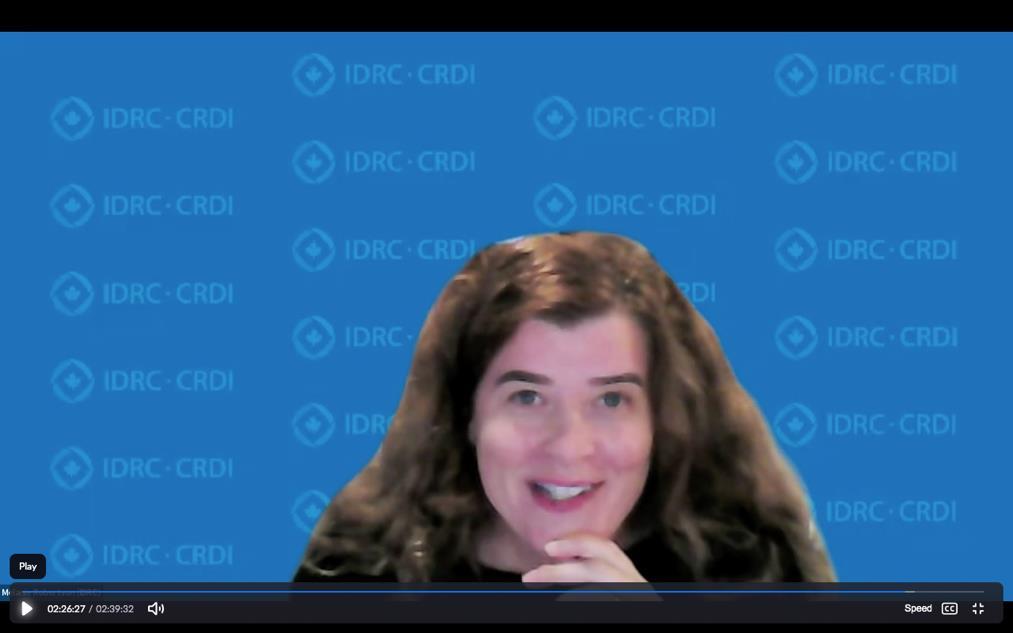



Monthly meetings will be held the last Thursday of each month at 5 p m Jakarta time (next meeting August 26). During these monthly meetings, participants will use a zoom room that will be available for them on Kistorm.
“I will take this opportunity to say thank you to all of you again for taking the time in your busy schedule to participate in, engage with, and embrace the assignments, despite the difficult situation for some of you and your families related to Covid.”
Melanie Robertson3:00
Jakarta time
Wednesday, July 21
Workshop Start
Opening Remarks
Anindya Chatterjee, IDRC

Setting the Stage: Workshop overview & objectives
Think Climate Indonesia Program
An interactive overview
Who’s Here and Why
Reviewing the knowledge, talent, and expertise in Zoom
Our Ideal Future
An activity to imagine the ideal outcomes of this program
Break Headlines From the Future
Imagining best possible outcomes
Harvesting Potential Ideas
Collecting ideas for group collaborations
Reflection
Where did we get; where are we going?
6:00 Finish
Thursday, July 22
3:00
Jakarta time
Opening Remarks
Santiago Alba Corral, IDRC
Sahba Chauhan, previously with the Oak Foundation, now with IKEA.

TCI Partners: Nations on an Island Descriptions and characteristics of each think tank

Compare and Contrast
Reviewing the commonalities and differences of the TCI partners
Break
Harvesting Potential Ideas
Collecting additional ideas for group collaborations

Presenting Well
Exploring the best and worst presentation styles
Tips & Tricks
Best practices for presenting our work
Reflection
Where did we get; where are we going?
6:00 Finish
Tuesday, July 27
3:00 Jakarta time
Opening Remarks
TBC, Oak Foundation

Peer Evaluation: PPC/o

A tool to give productive feedback to each other
Project Presentations
Each think tank gives a presentation and receives feedback
On-Boarding Feedback
A chance for immediate peer review comments
Break
Reviewing Potential Ideas
Exploring the themes/ideas for collaborations
Selecting a Direction
Moving towards consensus on a group collaboration
Next Steps
What happens now?
Reflection
Where did we get; where are we going?
6:00 Finish
Organization Participants

IDRC Melanie Robertson mrobertson@idrc.ca csturgeon@idrc.ca

Inclusive Innovation

-Maggie Dugan maggie.dugan@inclusiveinnovation.org
-Tee Keng Kok teekengkok@gmail.com
-Vincent Virat vince.virat@gmail.com
-Claudia Bosch clau.bosch.adrover@gmail.com
Kota Kita
-Rizqa Hidayani (Urban Planner) rizqa@kotakita.org
-Nayaka Angger (Program Officer – Research) angger@kotakita.org
-Vanesha Tio Manuturi (Communication and Advocacy Manager) vanesha@kotakita.org
-Fildzah Husna Amalina (Communications Officer) husna@kotakita.org
-Ahmad Rifai (Executive Director) rifai@kotakita.org
Kemitraan/Part nership for Governance Reform
-Amalia Fubani (Project Officer) amalia.fubani@kemitraan.or.id
-Inda Presanti Loekman (Head of Knowledge Management and Learning) inda.loekman@kemitraan.or.id
-Tities Eka Agustine (Researcher) tities.agustine@kemitraan.or.id
-Hery Sulistio (Researcher) hery.sulistio@kemitraan.or.id
-Ari Nurdiansah (Communication Specialist) arif.nurdiansah@kemitraan.or.id
Inobu -Venticia Hukom (Researcher, PhD Aquaculture Economics) vhukom@inobu.org
-Michael Padmanaba (Business Development Manager and Scientist, Ecology) mpadmanaba@inobu.org
-Adi Gangga (Research Officer) agangga@inobu.org
-Utami Putri Manvi (Program Manager) umanvi@inobu.org
-Arie Dwiyastuti (Operations Manager) adwiyastuti@inobu.org
-Adli Pramana (Program Officer) mpramana@inobu.org
PATTIRO -Bejo Untung (Executive Director) bejo@pattiro.org
-Ramlan Nugraha (Program Manager) ramlan@pattiro.org
-Maya Rostanty (Researcher - Supervisory Board) mayatanty@pattiro.org
-Ardhi Maulana Fajrin (Field Researcher) alan@pattiro.org
-Fitria Muslih (Researcher - Executive Board) fitria@pattiro.org
-Yulius Hendra (Advisor) yulius@pattiro.org
-Diah Mardhotillah (Research Assistant) diah@pattiro.org
World Resource Institute



Indonesia
-Dean Affandi (Research Data Innovation (RDI) Manager) Dean.Affandi@wri.org
-Adi Pradana (Senior Manager, Sustainable Landscape and Cities) Adi.Pradana@wri.org
-Ary Lesmana (Head of Operations, Monitoring and Evaluation) Ary.Lesmana@wri.org
-Tezza Napitupulu (Economic Researcher) Tezza.Napitupulu@wri.org
-Cynthia Maharani (Climate Research Analyst) Cynthia.Maharani@wri.org
-Lasiran Silalahi (Grant and Finance Manager) Lasiran.Silalahi@wri.org
-Rizky Haryanto (Researcher) Rizky.Haryanto@wri.org
Special Guests Sa Santiago Alba Corral, IDRC Climate-Resilient Food System, Program Director
- Anindya Chatterjee, IDRC Asia Regional Office Director, based in Delhi
- Marco Rondon, IDRC Co-PO for this Initiative


- Sahba Chauhan IKEA Foundation (previously at Oak Foundation)




Some words participants shared in closing:
“Big thank to Maggie, Tee, Vincent, Claudia for facilitating the workshop. Definitely a learning lesson for personal and organizational growth. Also thank Melanie for a great support!”
“Thank you very much Maggie, Tee, Vincent, Melanie, and Claudia! Superb workshop! And everyone, it’s really nice to meet you all!!”
“Amazing, thank you to Melanie and the facilitators, thank you for giving the experience of a virtual workshop that can be packaged in a very interesting and very productive way and in an atmosphere of positive vibes. Thanks for the very helpful Kistorm”
“Thanks Melanie, Maggie, Tee and Vincent for great facilitation”
“Thank you Melanie, Maggie, Tee, Vincent, and Claudia! Appreciate your effort!”



The Cases of Four Provinces: Nusa Tenggara Timur, Jambi, Papua Barat, Sulawesi Tenggara.
In Indonesia, a changing climate has led to the slow growth of crops, decreasing crop yields, crop failure, and competition over water. Faced with food shortages and the increased threats of climate change, populations have turned to agroforestry as a way to mitigate these threats and adapt for the future. As a sustainable agricultural practice, agroforestry offers trees as a source of income for farmers and nutrients for other crops, reduces human impact on natural forests and ecosystem services, improves soil fertility, and enhances local climate conditions. These practices offer direct benefits for local adaptation and help ensure that climate-related extreme events such as drought and floods will have fewer negative impacts on smallholder farmers. They also contribute to global efforts to control greenhouse gas concentrations.
The research will explore how sustainable agroforestry can help communities by diversifying livelihoods and developing climate-resilient agriculture practices. The research will focus on food production activities in four provinces: examining food production in times of drought in Nusa Tenggara Timur, the diversification of oil palm farmers in Jambi, the reliance on imported staples in Papua Barat, and the diversification of crops in Sulawesi Tenggara. The new data generated will feed the open-access, national, social-ecological database currently under development, which will serve as a laboratory for climate action.
Key local partners include AKAPe Foundation, Serikat Petani Kepala Sawit, Walhi Sulawesi Tenggara, and Wahana Tani Mandiri, as well as the provincial government of Papua Barat. A memorandum of understanding has already been signed, ensuring the data will inform policies developed by the Ministry of Agriculture, the Ministry of Environment and Forestry, and the National Planning Agency.
More than a decade ago, the Indonesian government introduced a Social Forestry program designed to improve local communities’ access to forest management. Despite the extended timeframe, it is still unclear how the policy contributes to climate adaptation strategies and helps forest-dependent communities secure their food supply. WRI Indonesia has been engaged
in long-term research in the protected forest of Suligi-Batu Gajah and Rimbang Baling’s conservation forest and has found that the demand for palm oil and lack of government enforcement means that farmers in Suligi-Batu Gajah will likely expand their plantations into the remaining forest. Meanwhile, Rimbang Baling, a wildlife reserve that is home to endangered Sumatran tigers, is also home to Kekhalifahan Sanggan, an Indigenous community that has lived there since before Indonesia gained independence.
The research will generate best practices for sustainable and inclusive community-based forests management and for the restoration of food subsistence and livelihood opportunities that rely on forest resources. These results will feed the new Food and Land Use (FOLU) coalition platform, which aims to create an integrated food and land use system. FOLU will provide space to discuss proven practices and what they contribute to the sustainable transformation of food systems, influencing food policy at the local level.
WRI-Indonesia will continue to partner with local institutions in Riau such as provincial and municipality governments, universities, communities, and local non-governmental organizations for this research.


Many Indonesians rely on the forests for their livelihoods, but agricultural expansion has meant significant forest loss, threatening the lives of these populations and contributing substantially to global greenhouse gas emissions and consequently to climate change. Recognizing these threats, the government of Indonesia established the Forest and Land Rehabilitation program as part of the National Medium-Term Plan (RPJMN) 2020–2024. This program aims to replant 420,000 hectares of critical land every year, with the goal of recovering 2.1 million hectares by 2024, by, in part, licensing the local farming communities to replant and cultivate the land.
The research will evaluate the impact of this rehabilitation program on farmers’ livelihoods and on emissions levels, and will also evaluate the effectiveness of the program itself. The research activities will be conducted in East Kalimantan province. The research contributes to one of the main components of Indonesia's low carbon development policy and informs the 2020–2024 National Medium-Term Development Plan (RPJMN), both of which include significant land and forest rehabilitation programs.
The research will be implemented in collaboration with social forestry permit holders and local non-governmental organizations. The Ministry of Environment and Forestry and the provincial government of East Kalimantan will also be key partners.
Climate Foodprint in Indonesian Cities: Studies from Semarang and Bima.

Unprecedented and rapid urban growth combined with growing climate pressures have created new food security issues in Indonesia’s urban landscape, affecting people’s access to food as well as the urban economic system as a whole. Food consumption patterns in the cities affect the global food system and contribute to carbon emissions and climate change, further exacerbating the impact of climate change on food security.
The research will examine how urban food consumption patterns and food systems contribute to climate change by examining the policies and activities of two cities that face different climate risks and food vulnerability issues: Semarang is faced with sea-level rise, while Bima struggles with drought and water availability. Researchers will develop a baseline understanding of the urban food system and the potential impacts of climate change on food security, including the availability, accessibility, and utilization of food, and then examine how this plays out for specific populations and sectors. The research will also focus on how urban food systems (from production and distribution to consumption) contribute to the production of greenhouse gas emissions and therefore climate change.
The research will be implemented in collaboration with the city governments of Semarang and Bima, local non-governmental organizations, and the Ministry of National Development Planning (Bappenas). The research will contribute to the National Action Plan for Climate Change Adaptation (RAN-API) with strategies aimed at ensuring food security through climate-smart agriculture and urban farming.

Achieving Sustainable Development Goal 13, which focuses on climate action, requires the coordination of all levels of Indonesian government, but studies have shown that budget planning has not brought the different sectors into dialogue; instead it has generated a “sectoral approach” to climate change. Kemitraan previously found that overlapping and inconsistent climate change policies and regulations from different levels of government hinder the effective implementation of national government policies at the sub-national level. A budgetary commitment to climate change is crucial if sub-national governments (provinces, cities, and districts) are to prioritize climate governance.
Using relevant expenditure data sets created by Climate Budget Tagging (CBT), researchers will develop comprehensive climate mitigation and adaptation policy recommendations for subnational governments. Analyzing data from two levels of sub-national government in five provinces, the research will examine food security, budgetary commitments to productivity (including seeds, fertilization, and use of pesticides), low emissions agriculture, small-scale and urban farming, livestock food and vaccines, fisheries, plantations, and forests. The results of the CBT will feed the notable Indonesia Governance Index (IGI) in climate resilience, allowing stakeholders to map the overall state of climate resilience readiness at sub-national levels.
Key partners in this research include the Ministry of Finance, who will enhance current regional fiscal incentives and disincentives for sub-national governments, and the National Planning


Agency, who will focus on national development planning that emphasizes low emissions and sustainable development. Sub-national governments will also collaborate, ensuring they are well informed on pressing issues within their own regions and can reflect on their readiness to tackle climate change.



Project Manager: Melanie Robertson mrobertson@idrc.ca


Workshop facilitators: Maggie Dugan maggie.dugan@inclusiveinnovation.org


Tee Keng Kok teekengkok@gmail.com
Vincent Vira
vince.virat@gmail.com
Report author:
Claudia Bosch Adrover clau.bosch.adrover@gmail.com
http//inclusiveinnovation.org
http://hackthesdgs.org
Don’t let COVID-19 keep you from hosting meetings and workshops: https://bit.ly/go_virtual
C/ Major de Sarria, 210 08017 Barcelona
Spain
42 rue des Rosiers
75004 Paris
France
13 Ruggin Hill, Holkan Road Paulshof, Johannesburg 2191
South Africa
1207 Delaware Avenue Buffalo, NY, 14209
United States
St. John’s Innovation Centre, Cowley Road, Cambridge, Cambridgeshire, CB4 0WS, United Kingdom